LGBTQ Non-Profit Organizations
In 2023: National LGBTQ Task Force celebrates 50 years
50th Anniversary celebrations begin with Creating Change, including headlining speakers Angelica Ross & activist X Gonzalez
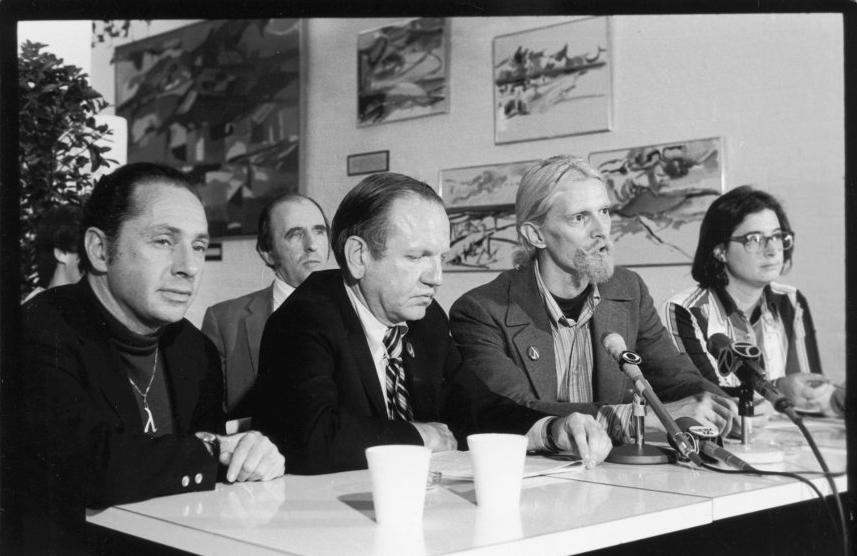
WASHINGTON – The National LGBTQ Task Force – the country’s oldest LGBTQ advocacy group – celebrates its 50th anniversary in 2023, honoring 50 years of advancing freedom, justice, and equality for LGBTQ people.
This milestone year will recognize and celebrate the Task Force’s rich history of driving progress within the LGBTQ community, from its early days lobbying the American Psychiatric Association to remove homosexuality as a mental illness and advocating for AIDS funding to longstanding campaigns to Queer the Census, Queer the Vote, work for trans rights, fight for reproductive justice and bringing an intersectional approach to the LGBTQ movement.
Beginning with Creating Change, the Task Force’s flagship conference for training and mobilizing queer organizers, the upcoming year serves as an opportunity to reimagine what queer activism can look like.
“Our anniversary comes at a time when those in power threaten to undo our 50 years of progress– but we’re meeting these threats with more strength, unity, and support than ever before,” said Kierra Johnson, Executive Director of the National LGBTQ Task Force. “We take an intersectional, proactive approach to our advocacy, underscoring our fundamental interconnectedness. The Task Force is everywhere because queer people are everywhere. As we look towards the next 50 years, we will evolve and expand our work to positively impact LGBTQ folks’ ability to thrive.”
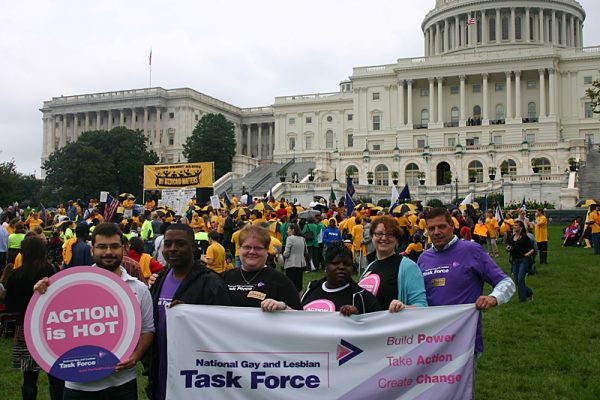
The primary goal of the Creating Change Conference is to build the LGBTQ movement’s political power from the ground up to secure our overarching goal of full freedom, justice, and equality for lesbian, gay, bisexual, transgender, and queer people in the U.S.
Since 1988, Creating Change has created opportunities for thousands of committed people to develop and hone their skills, celebrate victories, build community, and to be inspired by visionaries of our LGBTQ movement and allied movements for justice and equality.
50th ANNIVERSARY CALENDAR OF EVENTS
The Task Force 50th anniversary celebrations kickoff with the 2023 Creating Change Conference, the foremost political, leadership, and skills-building conference for the LGBTQ social justice movement. Event details:
- Date: Friday, February 17 – Tuesday, February 21
- Location: Hilton Hotel Union Square, San Francisco, California
- Special Guests:
- Angelica Ross, transgender rights activist and star of FX’s POSE
- Amy Schneider, most successful female contestant in Jeopardy! history
- X González, gun violence prevention activist and LGBTQ rights advocate
- more to be announced….
- Theme: The State of the Movement: Our Past. Our Present. Our Future.
Kierra Johnson, Executive Director of the National LGBTQ Task Force will reflect on the last year and the work ahead. For more information including registration information and full schedule see HERE.
The 50th Anniversary celebration will continue in Miami Beach at the 30th Annual Winter Party Festival – a week-long series of events benefiting the LGBTQ community locally and nationally. Produced by the Task Force, the Festival takes place Wednesday March 1 – Tuesday March 7 in Miami Beach, FL. The 2023 theme is “Live Free. Play Hard. Give Back.”
In October 2023, the Task Force will host its premier annual celebration of South Florida’s LGBTQ community. This year, the gala is an opportunity for queer people and their supporters to celebrate 50 years of community, history, and work advancing equality for all LGBTQ people and their families.
LGBTQ Non-Profit Organizations
Evan Low named next LGBTQ+ Victory Fund president
Former Calif. lawmaker to succeed Annise Parker

The LGBTQ+ Victory Fund and LGBTQ+ Victory Institute have named gay former California state Rep. Evan Low to serve as its next president and CEO, the groups announced on Tuesday.
“Today, we face an existential crisis,” he said. “The LGBTQ+ community, along with other historically excluded communities, are being systematically legislated out of existence.”
He added, “I am committed to ensuring our voices are not just included, but impossible to ignore—and represented at the highest levels of office.”
Low will succeed former Houston Mayor Annise Parker, who announced in February 2024 that she would step down after leading the organizations since 2017.
The Victory Fund works to increase the number of LGBTQ+ elected officials serving in all levels of government and “has helped thousands of LGBTQ+ candidates win local, state, and federal elections.” The Victory Institute works to ensure “the success of our LGBTQ+ elected and appointed officials at all levels of government.”
Before his election to the California State Assembly, where he served from 2014-2024, Low was the first Asian American to serve on the Campbell City Council, going on to lead the city as the country’s youngest openly LGBTQ+ mayor.
In the state legislature, Low “led groundbreaking efforts in marriage equality, LGBTQ+ rights, and economic opportunity,” the Victory Fund said in a press release.
“His leadership and service have been widely recognized, earning him multiple ‘Legislator of the Year’ honors and a proclamation of ‘Evan Low Day’ from then-San Francisco Mayor Gavin Newsom.”
LGBTQ Non-Profit Organizations
Blade to cover Creating Change conference in Las Vegas
National LGBTQ Task Force convenes movement leaders at a pivotal moment

The Los Angeles Blade will be in Las Vegas this week to cover the National LGBTQ Task Force’s flagship annual Creating Change conference, Jan. 21-26, where movement leaders will convene at a pivotal moment for LGBTQ+ rights.
More than 3,000 are registered to attend, nearly a third of whom identify as transgender or gender nonconforming, and more than half as people of color. A livestream of the plenary sessions is available here.
This year’s conference comes days after the inauguration of President Donald Trump, along with his administration’s issuance of executive orders targeting immigration and LGBTQ+ rights, together with the revocation of his predecessor’s executive actions that established and clarified rights and protections for these and other marginalized communities.
For instance, Trump on Monday signed an order to direct the federal government to recognize only two genders, based on birth sex, which will likely mean that U.S. citizens will no longer be able to select the “X” gender marker for their passports and official documents, though the U.S. State Department has not provided clarity on how that will be enforced.
In recognition of the shifting legal and regulatory landscape — and the need for immigrant and trans or gender nonconforming communities to understand and prepare for changes in the coming weeks and months — the Task Force this year has organized sessions like “Protecting Your Rights: Navigating Legal Systems” with attorneys from the Transgender Law Center, the National Center for Lesbian Rights, and Oasis Legal Services.
Along with covering breaking news from sessions during the four-day program, the Blade will be talking with experts for stories focused on the backlash against diversity, equity, and inclusion initiatives, the Trump administration’s expected ban on military service by trans people, insights into how major LGBTQ+ advocacy organizations are preparing to push back against actions by this White House and congressional Republicans, and more.
LGBTQ Non-Profit Organizations
Quinceañera fashion show raises record-breaking funds
The Trans Latin@ Coalition raised approximately $300,000 to continue funding vital programs
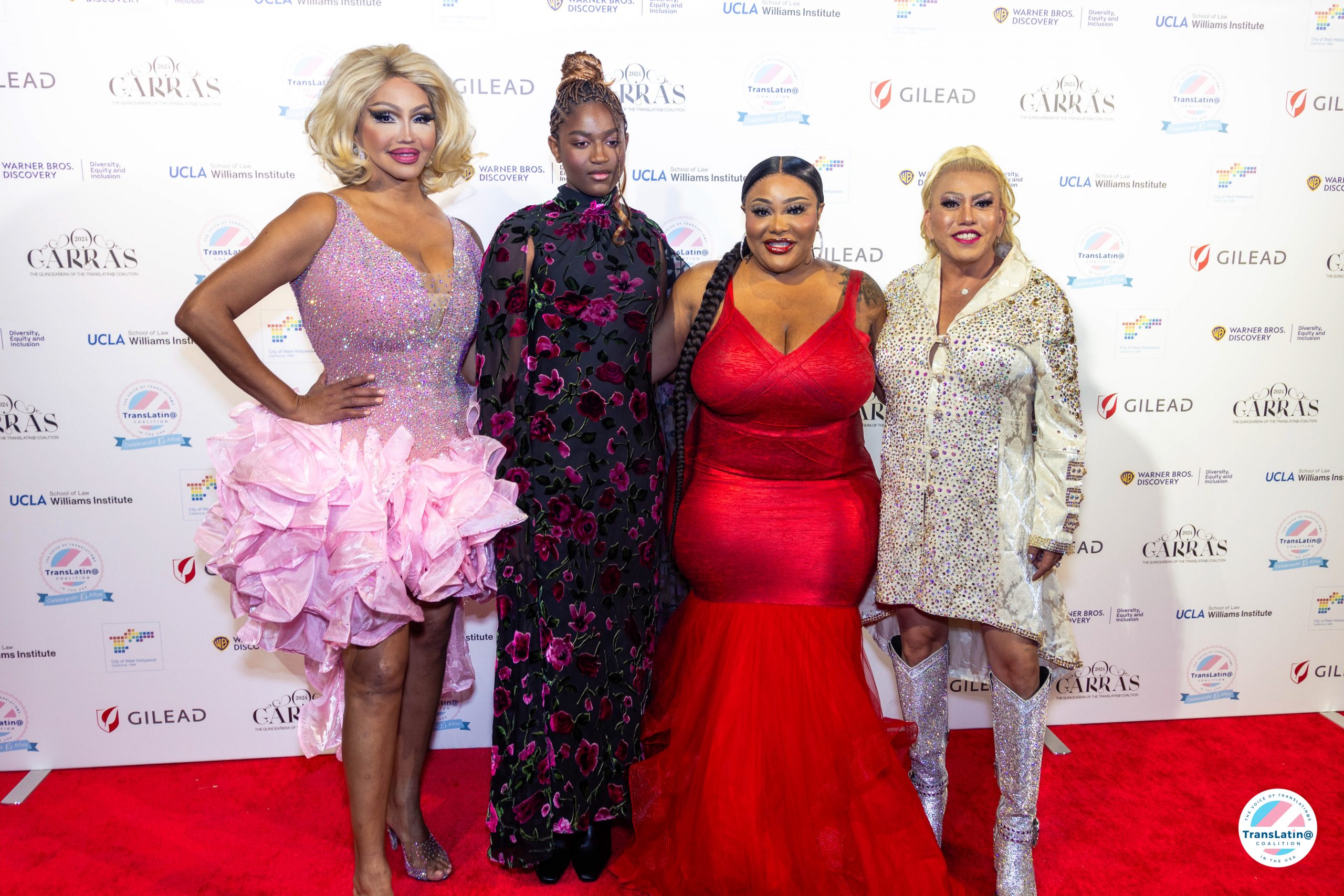
The Trans Latin@ Coalition raised a record-breaking amount of money at their quinceañera, celebrating fifteen years of helping the Trans, Latin American communities of West Hollywood and Los Angeles. The event took place at the Pacific Design Center in West Hollywood, starting with a VIP reception and red carpet, followed by a fashion show featuring 14 designers. The 15th anniversary successfully highlighted the intersection of cultura, fashion and activism with a mariachi and fashion lines full of vibrant Latin American colors, patterns and embroidery.
The quinceanera’s fashion show is called GARRAS, which stands for Groundbreaking Activism Redirecting and Reforming All Systems. GARRAS is more than just a fashion show, it is also a movement to transform the Trans, Gender nonconforming and Intersex community–as well as their allies–into high-fashion icons.
GARRAS raises funds for the Trans Latin@ Coalition and uses these events to give TGI people a platform to showcase their talents, leadership and activism. The quinceañera-themed fashion show
Bamby Salcedo, CEO of Trans Latin@ Coalition spoke during the event to address not only the need for continued funding, but also to point out how much more unity the TGI and Latin American communities must demonstrate in light of the incoming Trump administration.
“I want to thank each and every one of you for supporting our work, for believing in our work and for participating in the change we are all working to create,” said Salcedo to the audience. “We’re here to raise funds to continue to do the work that needs to happen, especially because of what just happened [with the election]. And you know what? [The government] is trying to scare us and diminish who we are, and I say to all those mother f*ckers ‘F*ck you!”
The fashion show and reception brought in celebrity guests, models, influencers and many other queer Los Angeles socialites. Zaya Wade, Gia Gunn from Ru Paul’s Drag Race: Season 6, Mayhem Miller from Ru Paul’s Drag Race: Season 10, Heidi N Closet from Ru Paul’s Drag Race: Season 12 and many influencers and personalities.
The TGI designers who showcased their latest creations were: Leandrag, Enrique Montes, Semi Creations, Natalia Acosta, Royal Rubbish, ArmaniDae, Nuwa1997, Bad Burro, Life on Mars, HIM NYC, 10 eleven, Rag to Fab, Christiana Gallardo and Jesse Alvarado.
LGBTQ Non-Profit Organizations
Tim Walz to headline HRC National Dinner
Tickets are still available for the event on Saturday

Minnesota governor and Democratic vice presidential nominee Tim Walz will be the keynote speaker at the Human Rights Campaign National Dinner on Saturday, the organization announced on X.
BIG NEWS: We are thrilled to have Vice Presidential Nominee Governor Tim Walz join us at our National Dinner! He has been a steadfast champion for the LGBTQ+ community and will continue fighting for our rights once he is elected to the White House. pic.twitter.com/nRsZfzuMYg
— HRC 🥥🌴 (@HRC) September 4, 2024
Tickets are still available for the event. HRC is also hosting an Equality Convention this week, “a destination for trailblazers in politics, culture, and business who are igniting change and driving LGBTQ+ equality forward.”
When Vice President Kamala Harris, the Democratic 2024 presidential nominee, announced Walz as her running mate on Aug. 6, HRC President Kelley Robinson said her pick “sends a message that a Harris-Walz Administration will be committed to advancing equality and justice for all.”
The group wrote in a press release: “Governor Walz is a career-long champion for LGBTQ+ people. In 1999, as a history teacher and football coach, Walz sponsored the school’s first gay straight alliance student group.
“He opposed efforts to ban same-sex marriage in the Minnesota Constitution. While serving in Congress, he co-sponsored legislation to repeal the Defense of Marriage Act (DOMA), voted to repeal the discriminatory ‘Don’t Ask, Don’t Tell’ law, voted for the Matthew Shepard/James Byrd Jr. Hate Crimes Prevention Act and introduced legislation to protect LGBTQ+ service members from discrimination in benefits.
“As governor, Tim Walz signed an executive order banning the dangerous practice of ‘conversion therapy’ in Minnesota.”
HRC in May pledged $15 million to organize in key battleground states for the Democratic ticket. Just days after President Joe Biden stepped out of the race and backed Harris as the presumptive nominee, the group raised more than $300,000 for her campaign in a virtual fundraiser.
LGBTQ Non-Profit Organizations
GLAAD’s 2024 Accelerating Acceptance study documents disinformation’s impact
Group will review findings at the DNC

GLAAD released the 2024 Accelerating Acceptance study on Thursday, which found that acceptance for LGBTQ people remains at supermajority levels, but overall support for the community has dropped slightly as reports of discrimination have risen.
At a glance, the organization’s top-line findings reveal that:
- 95 percent of non-LGBTQ Americans believe schools should be safe and accepting for all youth,
- 93 percent say children should be taught to appreciate and accept people as they are,
- 80 percent support LGBTQ equal rights, down from a record high of 84 percent one year ago, and
- 70 percent of GenZ LGBTQ adults report discrimination based on their sexual orientation.
The 16-page report is available here. GLAAD’s Media Institute has published Accelerating Acceptance studies each year since 2015. The organization will hold a briefing at the Democratic National Convention on Aug. 20 to review this year’s findings.
As the data shows, “more non-LGBTQ people have been inspired to speak up for LGBTQ equality as a result of accurate news coverage,” GLAAD wrote in a press release, “and voters have shown up in election after election to reject extremist candidates and their anti-trans campaigns.”
However, along with the findings about discrimination — particularly among Gen Z adults, the largest population of out Americans in history — respondents also report “negative mental health impact, fear for their safety, and online and real world harassment as a result of the political discourse in the country.”
“GLAAD’s 2024 Accelerating Acceptance Study arrives at a monumental inflection point for the LGBTQ community and for our entire country,” GLAAD President Sarah Kate Ellis said. “While acceptance for LGBTQ people remains at supermajority levels, the data this year also sounds substantial alarms about threats to this progress and to freedoms valued by every American.”
“The same extremist lawmakers, judges and media sources targeting abortion access, contraception, free and fair elections, and free speech, are using the same strategies of fear and disinformation to undermine LGBTQ people and our equality,” Ellis said.
She added, “Fortunately, the data also points to proven ways to keep expanding and accelerating acceptance.”
The online study was conducted in January 2024 with a nationwide sample of 2,511 U.S. adults.
LGBTQ Non-Profit Organizations
GLAAD president under fire for excessive spending
Spokesperson called New York Times report ‘grossly misleading’

GLAAD President Sarah Kate Ellis is under fire for excessive spending following a report in the New York Times on Thursday, which suggested the first class airfare, hotel accommodations, and car services booked by the organization’s chief executive for business travel far outpace the expenses of leaders of similarly sized nonprofits.
Quoting legal, nonprofit, and ethics experts, the article suggests Ellis and GLAAD’s actions may also have violated IRS rules, including their decision to not declare spending on Ellis’s home office renovation as income on her personal tax forms.
When Ellis joined in 2014, the article notes, GLAAD was in dire financial straits. Elevating the group’s public profile and expanding its purview, Ellis had quintupled its revenue to $19 million by 2022.
“Major donors have included media and tech companies such as Netflix, Google, and the Walt Disney Company; philanthropists like Ariadne Getty; and the New York City Council,” the Times wrote. “In 2022, the billionaire MacKenzie Scott donated $10 million.”
GLAAD’s chief communications officer, Rich Ferraro, said the board took Ellis’s performance into consideration when deciding her compensation, as under her leadership the advocacy group had started punching above its weight.
In a statement to the Advocate, Ferraro called the article “deeply misleading,” specifically disputing claims about Ellis’s annual compensation and denying that she ever took home “anything near” $1 million per year.
The organization has tussled with the Times in the past over the paper’s coverage of transgender issues. The Times, meanwhile, told the Advocate the paper stands by its reporting and noted GLAAD did not challenge any facts in the story.
Andy Lane, who has held senior roles in LGBTQ philanthropy, wrote on Facebook “GLAAD is a fraud, and has been as long as I’ve been in the business. For shame: And … girl, bye. Long overdue.”
History
LGBTQ+ History Archive Gains Momentum: Personal Stories Project Partners with George Takei
Increased Awareness Through Social Media Reach

The LGBTQ+ History Archive Personal Stories Project is experiencing a surge in submissions. This decade-long effort documents LGBTQ+ history through personal narratives. Its success stems from a new partnership with actor George Takei and the .gay domain provider.
Charles Chan Massey co-founded and directs the Personal Stories Project. He credits the partnership’s success to Takei’s vast social media following. Takei, a vocal LGBTQ+ rights advocate, encouraged his 3.3 million X followers to share their stories.
Takei posted: “Each of us in the LGBTQIA+ community has a powerful coming-out story to tell. I want to hear yours. Head over to personalstories.gay today. Fill out the form to be featured on the Personal Stories website. I’ll be sharing some throughout the month to inspire others.”
Amplifying Community Voices
Logan Lynn is the creative director of .gay Domains. He emphasizes the partnership’s role in amplifying vital LGBTQ+ voices.
“Pride is about honoring and celebrating the depth of our communities,” Lynn said. “What better way to showcase this than through stories from people living LGBTQIA+ lives?”
Preserving Everyday Stories for Future Generations
Massey founded the LGBTQ+ archive project in 2012. His mission: preserve narratives of ordinary LGBTQ+ individuals, not just prominent figures.
“I wanted to archive our community’s history,” Massey explained. “Not just prominent members, but regular people who needed a platform. Regular people can identify with regular people. It’s important to see someone just like you.”
Massey maintains an online archive. This ensures accessibility of these oral histories for the LGBTQ+ community.
“As long as the internet exists, it can archive our stories,” Massey said. “We’re preserving stories for future generations. We’re also helping people find others with similar journeys.”
From Facebook Page to Registered Charity
The LGBTQ+ History Archive Personal Stories Project started as a simple Facebook page. It has evolved into a dedicated website and registered charity. It now supports LGBTQ+ organizations across the US and Canada.
Many participants share how LGBTQ+ organizations helped them. The Personal Stories Project encourages donations to these charities. Massey reports raising $15,000 to $25,000 annually for over 20 non-profits.
“95% of our budget goes to other 501(c)(3) organizations,” Massey said. “We support large and small community-based groups. A $200 donation can make a significant difference.”
A Diverse Collection of Experiences
The Personal Stories Project has a vast collection of LGBTQ+ stories. Massey is often struck by the depth of experiences shared.
“I met Peter, who was 85 at the time,” Massey shared. “He served in the Air Force, modeled in the 1940s, started an ad agency, and lived through the AIDS crisis. His story shows the power of these narratives.”
The project seeks submissions from all parts of the LGBTQ+ community. This includes people of various ethnicities and generations.
“People often think their story isn’t interesting,” Massey said. “But when they share, it’s captivating! Someone will identify with your story. Sharing is a powerful gift and a responsibility.”
Share Your Story
Do you have an LGBTQ+ story to share? Visit personalstories.gay to contribute to this important historical archive.
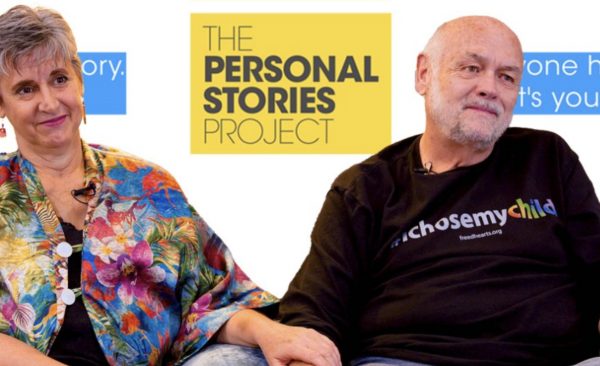
Image from Personalstories.gay website
LGBTQ Non-Profit Organizations
Pro-Palestinian activists protest LGBTQ+ group’s gala in NYC
Israel-Hamas war opposition to overshadow Pride events

NEW YORK — More than 300 people who protested outside an Outright International gala on Monday criticized the organization for its “silence and refusal to use” its network “and advocacy to provide immediate relief to Palestinians” who remain in the Gaza Strip.
Members of ACT UP, the Audre Lorde Project and other groups who were outside Pier 60 in Manhattan’s Chelsea neighborhood handed out flyers that read “Israel bombs queers” and “no Pride in genocide” as gala attendees arrived. A press release notes upwards of 100 people held a “die-in” for 241 seconds “to signify the 241 days of Israel’s bombardment of Palestine.”
Actor Billy Porter is among those who Outright International honored at the gala.
Protest organizers in their press release noted Porter “signed onto a statement in support of the Zionist state of Israel” after Hamas, which the U.S. has designated a terrorist organization, launched its surprise attack against southern Israel on Oct. 7, 2023. The press release also criticized Porter over his “problematic comments in which he rebuffed James Baldwin’s anti-Zionist, pro-Palestinian stance while claiming to be the best person to direct and star in Baldwin’s biopic.”
ACT UP further reiterated its demands for Outright International, which advocates for LGBTQ+ and intersex rights around the world.
• Amplify the struggle to decolonize Palestine
• Support local LGBTIQ Palestinian orgs with funding
• Advocate at the United Nations to stop US-supported human rights violations
• Disclose and divest from funders with links to Israel
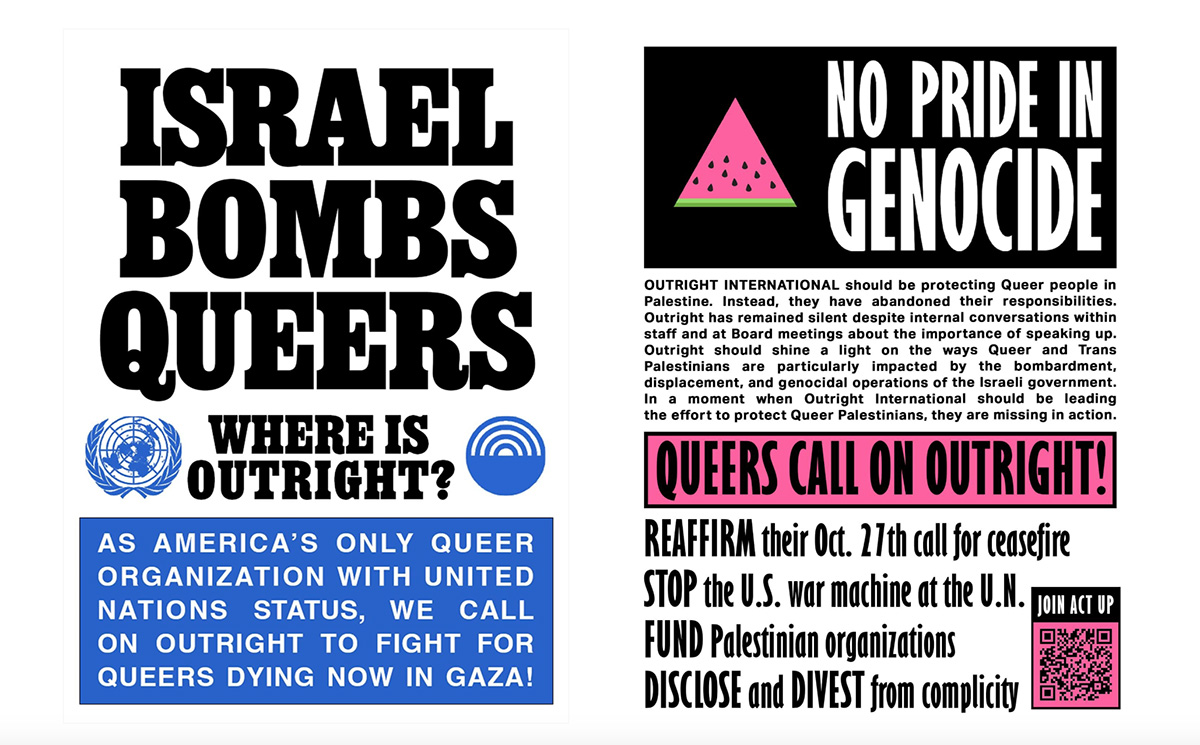
Outright International on Oct. 27 publicly called for a ceasefire in Gaza. Maria Sjödin, the group’s executive director, on Monday noted the protest during their speech at the gala.
“Activism for a better world takes many forms, and that is a great thing,” said Sjödin. “One of those forms is to protest and some of you saw this action on the way in.”
The Washington Blade attended the gala, and saw some attendees wearing keffiyahs and watermelon patches that have emerged as symbols of Palestinian solidarity since the war between Israel and Hamas began after Oct. 7. Gala attendees cheered when Sjödin said Outright International “supports a peaceful protest without any reservation.”
“Outright supports the spirit of the protest to bring attention to the loss of human lives,” they said.
The Israeli government says Hamas militants killed roughly 1,200 people on Oct. 7, including at least 260 partygoers and others at the Nova Music Festival. The Israeli government on Tuesday said roughly 80 people who were taken hostage on Oct. 7 remain alive in the Gaza Strip.
The Hamas-controlled Gaza Health Ministry says more than 35,000 people have died in the enclave since the war began.
The International Criminal Court on May 20 announced it plans to issue arrest warrants for Israeli Prime Minister Benjamin Netanyahu, Israeli Defense Minister Yoav Gallant and three Hamas leaders — Yehya Sinwar, Mohammed Deif, and Ismail Haniyeh. Karim Khan, the ICC’s chief prosecutor, said the five men have committed war crimes and crimes against humanity in Gaza and Israel.
“The ICC prosecutor’s application for arrest warrants against Israeli leaders is outrageous,” said President Joe Biden in a May 20 statement. “Let me be clear: Whatever this prosecutor (Khan) might imply, there is no equivalence — none — between Israel and Hamas. We will always stand with Israel against threats to its security.”
The U.S. House of Representatives on Tuesday by a 247-155 vote margin approved a bill that would sanction the ICC. Forty-two Democrats supported the measure.
U.S. Rep. Ritchie Torres (D-N.Y.), who is a vocal supporter of Israel, on Sunday in an X post said “anti-Israel activists tore down the flag honoring me” on Fire Island as the first gay Afro-Latino person elected to Congress and “instead put up a flag honoring queer Palestinians.” The New York Democrat in another message wrote that ACT UP New York “proudly admits to illegally vandalizing the flag honoring me.”
Pro-Palestine protesters on Sunday disrupted the Philadelphia Pride March.
The annual D.C. Dyke March, which will be called Dykes Against Ge(NO)cide this year, will take place in Lafayette Park on Friday. A “Stop the Genocide” protest is scheduled to occur in front of the White House on Saturday at noon.
The Capital Pride Parade will begin three hours later at 14th and T Streets, N.W. Porter is among those who are scheduled to perform at the Capital Pride Festival that will take place on Pennsylvania Avenue, N.W., on Sunday.
The Muslim Alliance for Sexual and Gender Diversity and the U.S. Campaign for Palestinian Rights are among the groups on Tuesday that demanded Pride parade and national LGBTQ+ rights groups “immediately ban the corporations responsible for fueling the genocide in Gaza and worldwide colonial violence from sponsoring or participating in Pride events.” The organizations also released a set of demands that include:
- Ban weapons manufacturers from both participation in and sponsorship of Pride events.
- Support Palestinians and their resistance efforts.
- Condemn and work to dismantle pinkwashing and homonationalism.
- Call for an immediate, permanent ceasefire and an end to arming Israel.
- Cut ties with all organizations that profit from war, detention, and incarceration, environmental destruction, and displacement.
- Ban police from marching and participating in Pride, and denounce state violence.
“Over the past eight months, queer and trans people have been at the forefront of mobilizing for a liberated Palestine,” said Firas Nasr, a nonbinary activist and organizer who is based in D.C., in a press release. “Yet Pride organizations — and national LGBTQIA+ orgs that claim to represent our community — have largely remained silent while championing corporations behind the genocide.”
Nasir is among the upwards of 200 people who marched from Dupont Circle to the Human Rights Campaign in February and called upon it and other LGBTQ+ rights organizations to “demand an end to genocide and occupation of Palestine.” No Pride in Genocide organized the protest.
LGBTQ Non-Profit Organizations
Pride organizers called upon to ensure Jewish people can safely participate in events
A Wider Bridge sent letter to Capital Pride Alliance, other event organizers

NEW YORK — A Wider Bridge has called upon Pride organizers across the country to ensure Jewish people can safely participate in their events.
The group, which “advocates for justice, counters LGBTQphobia, and fights antisemitism and other forms of hatred,” sent a letter to the Capital Pride Alliance and more than 60 other Pride organizers.
“We know that the 2024 Pride season promises to be enormously important for our community,” wrote A Wider Bridge Executive Director Ethan Felson. “With LGBTQ+ rights under attack, our collective energy, commitment, and passion are needed more than ever. We deeply appreciate your tireless work to ensure that our voices are heard and that our community can come together, even in challenging times, to protest injustice and to celebrate our identities.”
“We write with a pressing concern,” added Felson.
This year’s Pride Month will take place eight months after Hamas launched its surprise attack against southern Israel.
The Israeli government says Hamas militants killed roughly 1,200 people on Oct. 7, 2023, including at least 260 partygoers and others at the Nova Music Festival. The Israeli government on Tuesday said roughly 80 people who were taken hostage on Oct. 7 remain alive in the Gaza Strip.
The Hamas-controlled Gaza Health Ministry says more than 35,000 people have died in the enclave since the war began. The National LGBTQ Task Force and Outright International are among the groups that have called for a ceasefire.
A press release that announced A Wider Bridge’s letter notes antisemitic attacks increased 337 percent between Oct. 7 and Dec. 7, and 93 percent of Jewish people said “antisemitism is a real problem in America.” The press release further notes LGBTQ+ Jewish people “have previously faced discrimination at Pride events” that include three people who said organizers of Chicago’s Dyke March in 2017 refused to allow them to participate because they had Jewish Pride flags.
“This year, ahead of Pride, we are seeing and hearing about attacks online against queer Jewish and Zionist individuals,” said A Wider Bridge in the press release.
The letter includes five recommendations for Pride event organizers.
- Engage with local LGBTQ+ Jews: Actively reach out to your local LGBTQ+ Jewish community, learn what their specific safety concerns are, and establish a relationship if you don’t already have one.
- Consult with safety personnel in advance: Assuming that law enforcement will be present at Pride, make it clear that they should respond to anti-Jewish harassment or violence according to agreed-upon protocols for any such behavior. Share relevant guidelines with Pride marshals and provide de-escalation training so they are equipped to reduce tensions.
- Carefully vet performers: In this tense political climate, it is more important than ever to vet performers both for the ability to speak respectfully to and about a diverse audience and to set clear expectations for performances at your event.
- Familiarize yourself with and display inclusive Pride flags: Jews have been excluded from Pride spaces for wearing a Jewish star or bringing Pride flags with Jewish stars, an ancient symbol of Jewish identity. Familiarize yourself with symbols that Jewish LGBTQ+ people may wear or display.
- Do not allow gate-keeping of LGBTQ+ Jews: Do not use litmus tests to determine which Jews are welcome at Pride, such as only permitting Jews with certain beliefs around or relationships with Israel and Palestine. All Jews should be welcome at Pride events.
Capital Pride has yet to respond to the Washington Blade’s request for comment on the letter.
LGBTQ Non-Profit Organizations
Record number of students reached by HRC’s anti-bullying program
The program’s 9th annual National Day of Reading- “A Celebration of Stories Supporting Trans & Non-Binary Youth” saw 36,000 participants
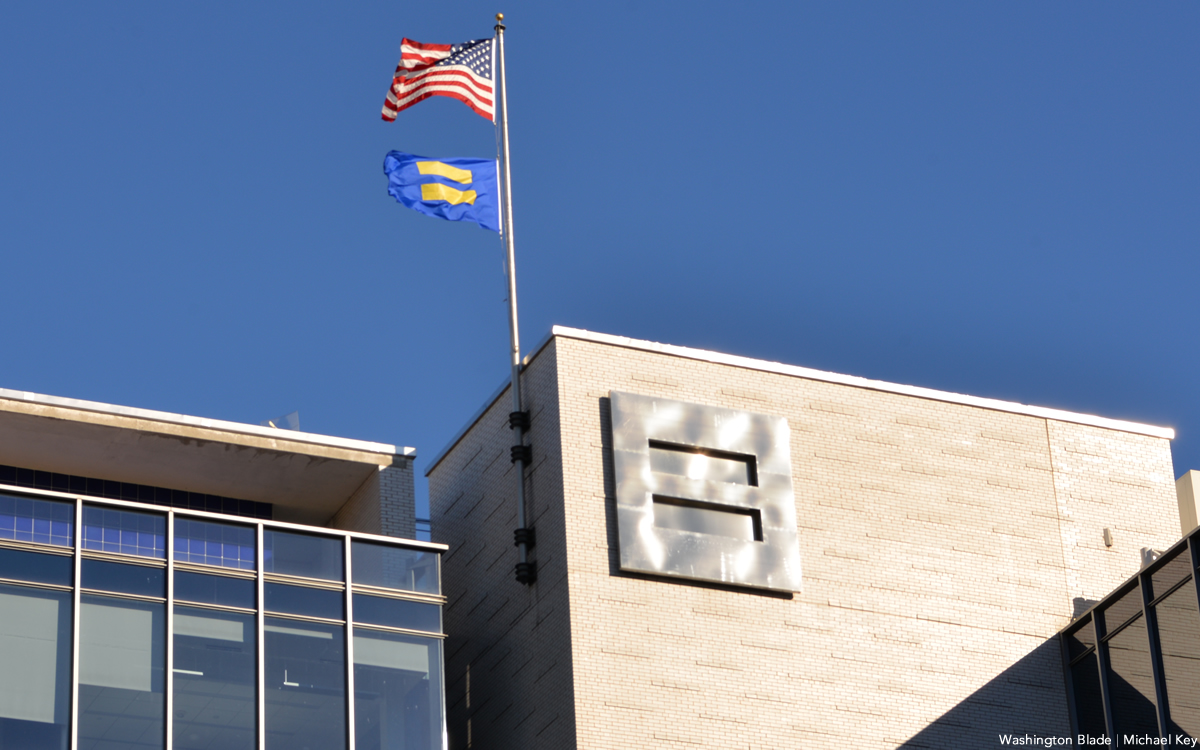
WASHINGTON — The Human Rights Campaign’s Welcoming Schools program reached a record 750,000 students in fiscal year 2024 — supporting communities that are contending with the dramatic rise, in recent years, of anti-LGBTQ harassment and reported hate crimes in schools.
Data on the expanded reach of HRC’s pre-K-12 anti-bullying program, now in its 16th year, was included in the group’s fourth annual Welcoming Schools report, released on Tuesday.
“Welcoming Schools has continued to serve as a beacon, providing accessible training, resources, and actionable policies and practices at a time when proposals for anti-LGBTQ+ legislation specifically targeting our youth is at a devastatingly high level,” the group’s president, Kelley Robinson, said in the report’s introduction.
A third of the more than 550 anti-LGBTQ bills that were introduced across the U.S. last year have targeted LGBTQ inclusion in classrooms, disproportionately impacting transgender and gender-expansive youth, HRC noted in a press release announcement.
The “unsurprising result” of these legislative attacks, the organization wrote, has been a documented rise in bullying and harassment encountered by queer youth in educational settings.
According to an analysis of FBI statistics reported in March by the Washington Post, “the number of hate crimes on K-12 campuses” in states with restrictive laws “has more than quadrupled since the onset of a divisive culture war that has often centered on the rights of LGBTQ+ youth.”
The paper also found that “calls to LGBTQ+ youth crisis hotlines have exploded, with some advocates drawing a connection between the political climate and the spike in bullying and hate crimes.”
And in a survey published in November by HRC and the University of Connecticut, nearly 60 percent of LGBTQ teens reported that they had experienced bullying in school over their sexual orientation or gender identity.
Cheryl Greene, senior director of the Welcoming Schools program, said in the press release that “this work across local school districts is crucial to the success of our kids in school, especially as we’ve seen and heard from families who are uprooting their lives and moving states just to find more accepting, inclusive environments.”
“Our 2024 annual report showcases the tremendous impact of our trainings and resources in fostering environments where all students can thrive,” she said.
Robinson highlighted that Welcoming Schools’ “latest initiatives showcase our commitment to expanding opportunities for secondary-level training, making resources more accessible through Spanish translation, and embracing the power of e-learning.”
This year, the program’s ninth annual National Day of Reading was titled, “A Celebration of Stories Supporting Transgender and Non-Binary Youth” saw 36,000 participants and reached 130,000 people on social media.
According to the report, “Since 2011, Welcoming Schools has trained educators in all 50 States, plus D.C., Aruba, Bahamas, Denmark, El Salvador, Germany, Honduras, Mexico, Qatar, Taiwan, and Uganda.”
-

 Breaking News2 days ago
Breaking News2 days agoMajor victory for LGBTQ funding in LA County
-

 Features2 days ago
Features2 days agoKoaty & Sumner: Finding love in the adult industry
-

 Books4 days ago
Books4 days agoTwo new books on dining out LGBTQ-style
-

 Miscellaneous2 days ago
Miscellaneous2 days agoCan you really find true love in LA? Insights from a queer matchmaker
-

 Commentary8 hours ago
Commentary8 hours agoBreaking the mental health mold with Ketamine: insights from creator of Better U
-

 El Salvador3 days ago
El Salvador3 days agoLa marcha LGBTQ+ desafía el silencio en El Salvador
-

 Arts & Entertainment2 days ago
Arts & Entertainment2 days agoIntuitive Shana gives us her hot take for July’s tarot reading
